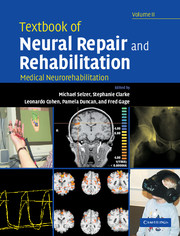Book contents
- Frontmatter
- Contents
- Preface
- Contributors
- Contributors
- Neural repair and rehabilitation: an introduction
- Section A Technology of neurorehabilitation
- Section A1 Outcomes measurement and diagnostic technology
- Section A2 Therapeutic technology
- Section B Symptom-specific neurorehabilitation
- Section B1 Sensory and motor dysfunctions
- Section B2 Vegetative and autonomic dysfunctions
- 22 Rehabilitation of the comatose patient
- 23 Plasticity in the neural pathways for swallowing: role in rehabilitation of dysphagia
- 24 Autonomic dysfunction
- 25 Sexual neurorehabilitation
- Section B3 Cognitive neurorehabilitation
- Section C Disease-specific neurorehabilitation systems
- Index
- Plate section
25 - Sexual neurorehabilitation
from Section B2 - Vegetative and autonomic dysfunctions
Published online by Cambridge University Press: 04 August 2010
- Frontmatter
- Contents
- Preface
- Contributors
- Contributors
- Neural repair and rehabilitation: an introduction
- Section A Technology of neurorehabilitation
- Section A1 Outcomes measurement and diagnostic technology
- Section A2 Therapeutic technology
- Section B Symptom-specific neurorehabilitation
- Section B1 Sensory and motor dysfunctions
- Section B2 Vegetative and autonomic dysfunctions
- 22 Rehabilitation of the comatose patient
- 23 Plasticity in the neural pathways for swallowing: role in rehabilitation of dysphagia
- 24 Autonomic dysfunction
- 25 Sexual neurorehabilitation
- Section B3 Cognitive neurorehabilitation
- Section C Disease-specific neurorehabilitation systems
- Index
- Plate section
Summary
Introduction
Sexual dysfunction is a complication of a wide variety of neurologic disorders that include but are not limited to, myelopathies, such as multiple sclerosis (MS) and spinal cord injury (SCI), and central nervous system lesions, such as stroke and traumatic brain injury (TBI). Until recently, society has viewed the addressing of sexual and reproductive activities as taboo, especially when discussing the disabled or the elderly. However, sexuality is a normal physiologic process with profound effects upon quality of life, regardless of physical status, or age (Comfort and Dial, 1991).
Sexuality is the embodiment of sexual and reproductive activities involving complex interactions among biologic, psychologic, and social systems. An individual's perception of their sexuality, as well as society's perception can have an inestimable impact on their self-esteem, and hence their willingness to openly address these issues (Earle, 2001). Such barriers to communication represent a real challenge to practicing clinicians. However, advances in treatment options obligate the clinician providing care to those with neurogenic sexual/reproductive dysfunction to learn to communicate effectively about these issues, provide new therapies and refer patients to the appropriate specialists.
This chapter will provide an introduction to approaches in counseling, an overview of male and female physiology, and a description of common neurologic disorders and their impact on sexuality. Treatment options for those disorders are also reviewed.
Sexuality counseling for men and women
Having an in-depth understanding of the psychologic and social repercussions that can be a consequence of sexual dysfunction disorders is critical to the rehabilitation process of an individual that suffers from any type of neurologic disorder. Sexuality is an integral part of the human experience.
Keywords
- Type
- Chapter
- Information
- Textbook of Neural Repair and Rehabilitation , pp. 400 - 410Publisher: Cambridge University PressPrint publication year: 2006



